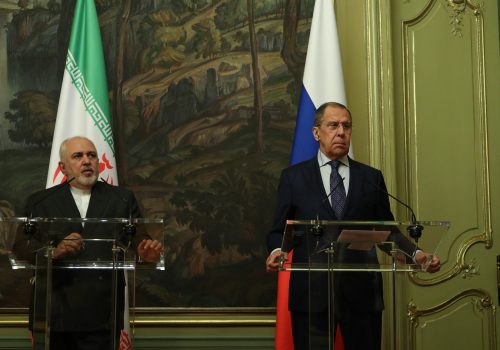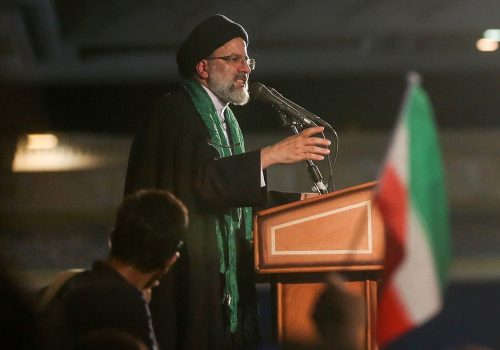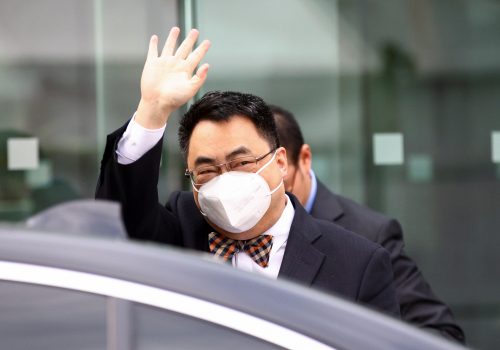Iran’s new president just met with Vladimir Putin in Russia. What to make of it?
Iranian President Ebrahim Raisi met with Russian President Vladimir Putin in Moscow on January 19. It was the first meeting by an Iranian president with his Russian counterpart since 2017. Both leaders and their governments emphasized the importance of the meeting and the friendliness of the Russian-Iranian relationship in the face of what they see as implacable US hostility. This Putin-Raisi meeting took place just prior to the start of a joint Russian/Chinese/Iranian naval exercise in the Gulf beginning January 21. But despite the high-profile nature of this summit, little of substance seems to have been agreed upon.
When they met, Putin observed that “We closely cooperate in the international arena” and made a point of stating how he wanted to hear Raisi’s position on various issues, including the Joint Comprehensive Plan of Action (JCPOA). For his part, Raisi told Putin that “We…have no restrictions on developing and expanding ties with friendly Russia and these ties will become strategic.”
Common themes in press coverage of the meeting emphasized how Russia and Iran support the Bashar al-Assad regime in Syria in what they refer to as an “anti-terrorist campaign,” share concern about events in Afghanistan, bemoan being the objects of unjustified American sanctions, and express a desire to boost their economic relationship.
Putin cited how Russian-Iranian trade grew 6 percent in 2020 despite the pandemic and that it grew by 38 percent in 2021. Still, overall Russian-Iranian trade remains modest ($3.3 billion in 2021) compared to Russian-Turkish trade (about $20-25 billion annually). Putin talked about establishing a free trade area between Iran and the Russian-led Eurasian Economic Union. Raisi noted how the Iranian delegation brought to Moscow “a document on bilateral strategic cooperation, which may determine [their] future relations for the next twenty years.” This was meant to be an update of an earlier economic cooperation agreement between Russia and Iran reached in 2001.
There was press coverage about how Iran sought to buy as much as $10 billion worth of Russian weaponry, including twenty-four Su-35 fighter jets and an unspecified number of S-400 air defense missile systems (Turkey’s purchase of these resulted in the US canceling sales of F-35 fighter aircraft to Ankara). No such agreement, though, was announced during the Putin-Raisi summit. According to Russian Middle East watcher, Kirill Semenov, a more realistic level of Russian arms sales to Tehran (should an agreement be reached), “could slightly exceed $2 billion, which is exactly the amount Moscow would be ready to provide as a loan to Tehran, which lacks cash.”
In the economic realm, Iran’s Finance Minister, Ehsan Khanduzi, stated that several “important” economic agreements were signed during the summit. One was about the expedited implementation of a $5 billion credit line. But this was something that was announced years ago and apparently has yet to be activated. Khanduzi also stated that this credit line would be used for competing railroad construction for the Iranian portion of the North-South Transport Corridor, which runs from the Iranian coast through the South Caucasus into Russia, as well as for about two hundred Russian locomotives. However, this is not a new project but an effort to revive one that Russian Railways stopped working on in April 2020 due to reported fears of running afoul of US sanctions on Iran.
The Iranian Oil Minister, Javad Owji, stated that several projects in the energy sector had been agreed to, but didn’t provide much detail about them. It’s unclear if these are new projects or ones that have been previously discussed and even agreed to, such as the one Lukoil stopped working on in 2018 after the US pulled out of the JCPOA (Lukoil was concerned about being targeted by US sanctions). Finally, the spokesperson of the Atomic Energy Organization of Iran said that there were talks about Russia building new atomic energy reactors at Iran’s Bushehr nuclear power plant. But whether this will actually occur is unclear since, according to Semenov, “Tehran has not yet paid its debts” for Russia’s completion of the first nuclear reactor at Bushehr.
Thus, the Putin-Raisi summit seems to have been less about the expansion of Russian-Iranian cooperation and more about its resumption. Even though there may not have been much agreed to in concrete terms, the importance of the Putin-Raisi meeting is that the two leaders see themselves as having common interests concerning the United States and that they see each other as partners against it. If nothing else, Putin and Raisi can rest assured that the other won’t cooperate with Washington against him, as Russian observers sometimes feared Iran’s previous president, Hassan Rouhani, might do after the signing of the nuclear accord in 2015. This may increase the prospects for more concrete military cooperation besides what they have already achieved in Syria, as well as greater Russian-Iranian economic cooperation in the future.
Mark N. Katz is a professor of government and politics at the George Mason University Schar School of Policy and Government, and a nonresident senior fellow at the Atlantic Council.
Further reading
Tue, Jan 19, 2021
Does Russia really want a US return to the Iran deal?
IranSource By
The Kremlin has also backed European efforts to save the Joint Comprehensive Plan of Action since the US’s unilateral withdrawal from the deal in 2018. Below the surface, however, Russia’s views may be more complicated and ambivalent.
Tue, Jun 22, 2021
An uncertain future for Iran under a minority president
IranSource By
On June 21, 2021, the Atlantic Council’s Future of Iran Initiative hosted an event to discuss the implications of Iran’s June 18 presidential elections for US-Iran relations. Read the key takeaways.
Wed, Dec 8, 2021
China is the real barometer of the state of Iran nuclear talks in Vienna
IranSource By
China, which played an important if secondary role during the final leg of nuclear negotiations during 2013-2015, is the most suited of the P4+1—Britain, China, France, Germany, and Russia—to exert effective leverage to bring Tehran back to compliance now.
Image: MOSCOW, RUSSIA - JANUARY 19, 2022: Russia's President Vladimir Putin (L) and his Iranian counterpart Ebrahim Raisi hold a meeting at the Moscow Kremlin. Pavel Bednyakov/Russian Presidential Press and Information Office/TASS.


